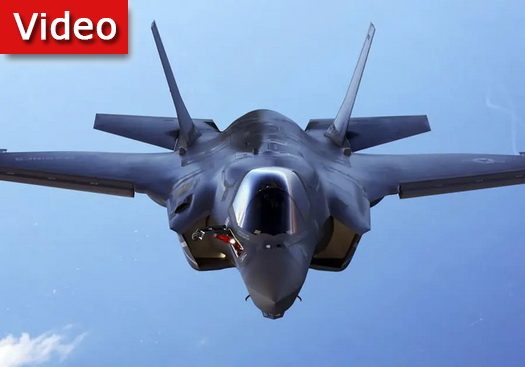
Israeli F-35 Attacked Missile Warehouse Near Iraq
Foreign media sources, quoted by News12, are reporting that an Israel Air Force (IAF) F35 plane struck targets in Iraq twice in a ten-day period. According to the report, the stealth fighter jet struck a missile warehouse near Bagdad.
Arab diplomatic sources reported on Tuesday to the a-Sharak al-Awsat newspaper in London that Israel has expanded its ring of attacks against Iran and Syria to Iraq. According to the report, the IAF for a second time in April, attacked an Iranian missile warehouse in a military base northeast of Bagdad. The reported attack occurred on July 19, 2019 in Iraq, carried out by an F-35 stealth fighter plane.
The report stated that in addition to the attack on July 19th, another attack took place on Sunday night, July 28th, in northeastern Bagdad, 80 kilometers (48 miles) from the Iranian border. The second assault targeted Iranian advisors and a target against a truck with ballistic missile launchers recently transferred from Iran to Iraq.
According to Western sources, Israel is also behind the recently reported attack on Daraa and Tel al-Khara in Syria, with the aim of “preventing Iran from taking control of this strategic hill”.
The Saudi al-Arabia TV reported about ten days ago of an aerial attack occurring in a Shiite militia camp in Iraq. According to the report, the camp targeted contained Iranian ballistic missiles as well as Hezbollah fighters as well as members of the Iranian Revolutionary Guard, who were killed. There is no confirmation from another source. The United States said it was not involved in the assault.
The last attack in Iraq came about a year after Reuters reported from Iran that Iran had delivered Shiite militias in Iraq that could reach Tel Aviv. The report aims to protect Iran’s Middle East interests and to ensure its ability to respond in the event of an attack.
The ballistic missile transferred to the Shiite militias which it supports in Iraq, including the Fatah 110 missiles, can hit targets in the range of 200 to 700 kilometers (120 to 420 miles). These missiles could threaten Tel Aviv if deployed in Western Iraq and they also threaten Saudi Arabia’s capital, Riyadh.
According to the report, the Iranian move could exacerbate the crisis between Tehran and Washington and embarrass the European powers that signed the nuclear deal with Iran as they try to save what is left of it. One Iranian source then explained to Reuters that “The logic of this act is that there should be a backup plan in case Iran is attacked”. He said the number of missiles delivered was not high, a few dozen, but he noted that the number could increase as needed.
These missiles could threaten Israel in the event that these missiles are deployed in western or southern Iraq, areas where there is a significant military arm of Iran. Some sources say that Qassam Suleimani, who is in charge of Iranian military forces outside the Islamic Republic, is himself responsible for overseeing the missile project in Iraq. In the past, Iran refused to address the issue, claiming that its missiles were defensive purposes only. On the recent transfer to the Shiite militias, Iran refused to comment, as did the government and the army in Iraq.










